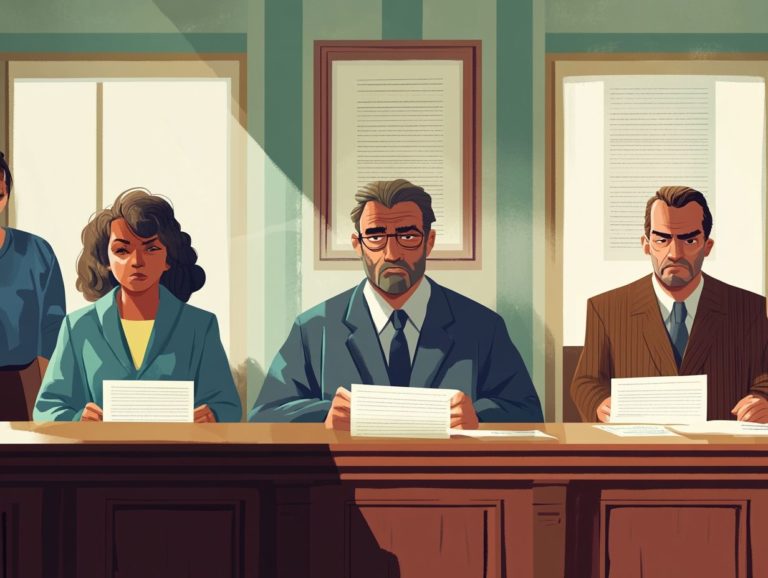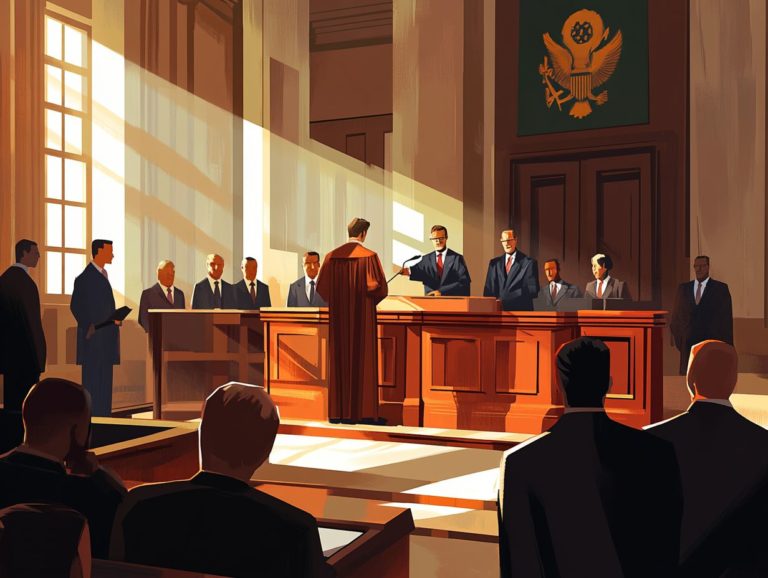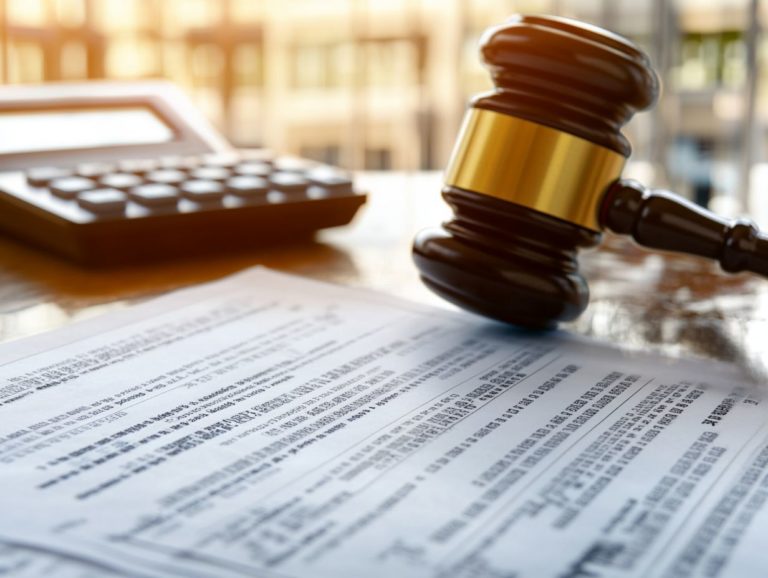What Happens to Plea Agreements?
Plea agreements play a key role in the criminal justice system. They give you, as a defendant, a chance to negotiate your charges and sentences.
This article delves into what plea agreements are and their purpose. We’ll guide you through the complex process of reaching one. You ll discover the various types available, including guilty pleas and no contest pleas.
This article weighs the benefits and drawbacks for both you and the prosecutors. It discusses what happens once an agreement is reached and examines your options for challenging or withdrawing a plea.
Get ready to navigate this crucial part of legal proceedings with clear insights!
Contents
- Key Takeaways:
- Understanding Plea Agreements
- The Process of Reaching a Plea Agreement
- Types of Plea Agreements
- Benefits and Drawbacks of Plea Agreements
- What Happens After You Reach a Plea Agreement?
- Challenging or Withdrawing a Plea Agreement
- Frequently Asked Questions
- What Happens to Plea Agreements?
- Can a Plea Agreement Be Withdrawn?
- What Happens if a Plea Agreement is Violated?
- Do All Criminal Cases Use Plea Agreements?
- Can a Judge Reject a Plea Agreement?
- What Happens if a Defendant Refuses to Enter into a Plea Agreement?
Key Takeaways:
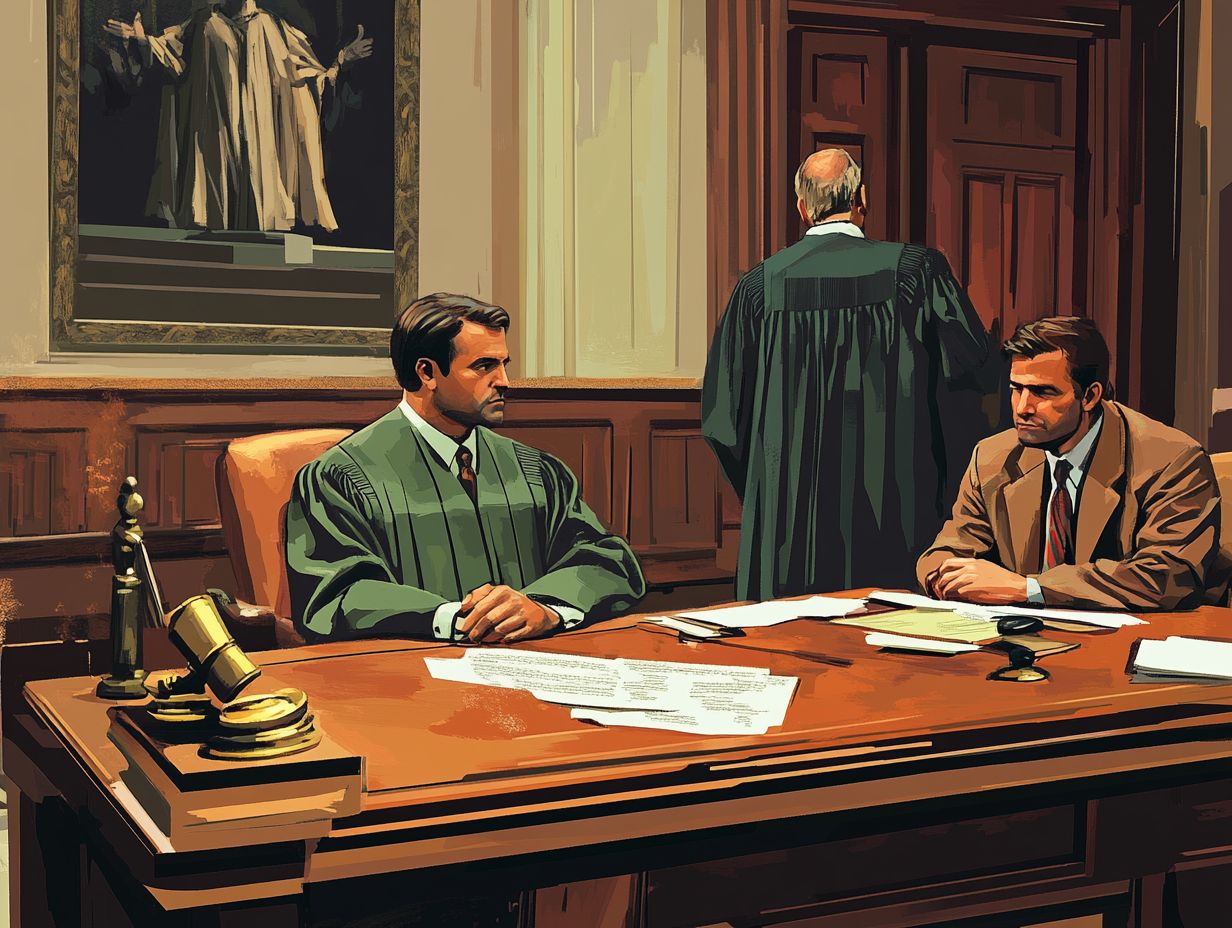
Plea agreements are deals between you and the prosecutor. You agree to plead guilty or no contest for specific benefits.
The type of plea agreement can lead to different consequences, including effects on your criminal record and sentencing.
Once a plea agreement is reached, both parties must fulfill their obligations. It may be challenging to dispute or withdraw the agreement later on.
Understanding Plea Agreements
Grasping the nuances of plea agreements is essential in criminal law. These agreements provide a strategic way for defendants to handle the complexities of their cases.
By opting for a plea bargain, you can plead guilty or no contest to lesser charges. This may result in a more lenient sentence while avoiding the uncertainties and risks of a jury trial.
This legal process requires substantial negotiations between the prosecution and defense. Ultimately, it necessitates court approval to safeguard your constitutional rights.
Definition and Purpose
A plea agreement, commonly known as a plea bargain, is an essential legal tool in the criminal justice system. It enables you to negotiate your charges and potential sentences with the prosecution.
This process promotes judicial efficiency by reducing the number of cases that go to trial, which can be time-consuming and costly.
By reaching an agreement, you may secure a lesser charge or a more lenient sentence. This allows prosecutors to allocate their resources more effectively to more serious cases.
Plea agreements significantly contribute to resolving cases, providing a degree of certainty in the outcome for both you and the prosecution.
However, when accepting a guilty plea, consider the implications: the potential lack of a trial, the impact on your criminal record, and future consequences of a conviction.
Ultimately, these agreements facilitate a more efficient legal process, benefiting the judicial system as a whole.
The Process of Reaching a Plea Agreement
The journey to a plea agreement unfolds through several negotiation stages between your attorney and the prosecution.
This complex process often culminates in a formal plea deal, which requires judicial approval to meet legal standards.
Negotiations and Factors Involved
Plea negotiations are influenced by various factors, including the strength of the evidence, your legal rights as a defendant, and the prosecution s duty to recommend fair sentencing guidelines.
A key aspect is the quality and reliability of the evidence against you. If the evidence is strong, you might seriously consider a plea deal, especially when faced with overwhelming proof of guilt.
Your prior criminal record can also impact negotiations. If you have a history of offenses, leniency may be harder to come by.
The prosecution’s willingness to propose lesser charges or reduced sentences can encourage a resolution that works for both parties. Each of these elements plays a vital role in shaping the final plea terms and influencing the outcome of your case.
Types of Plea Agreements
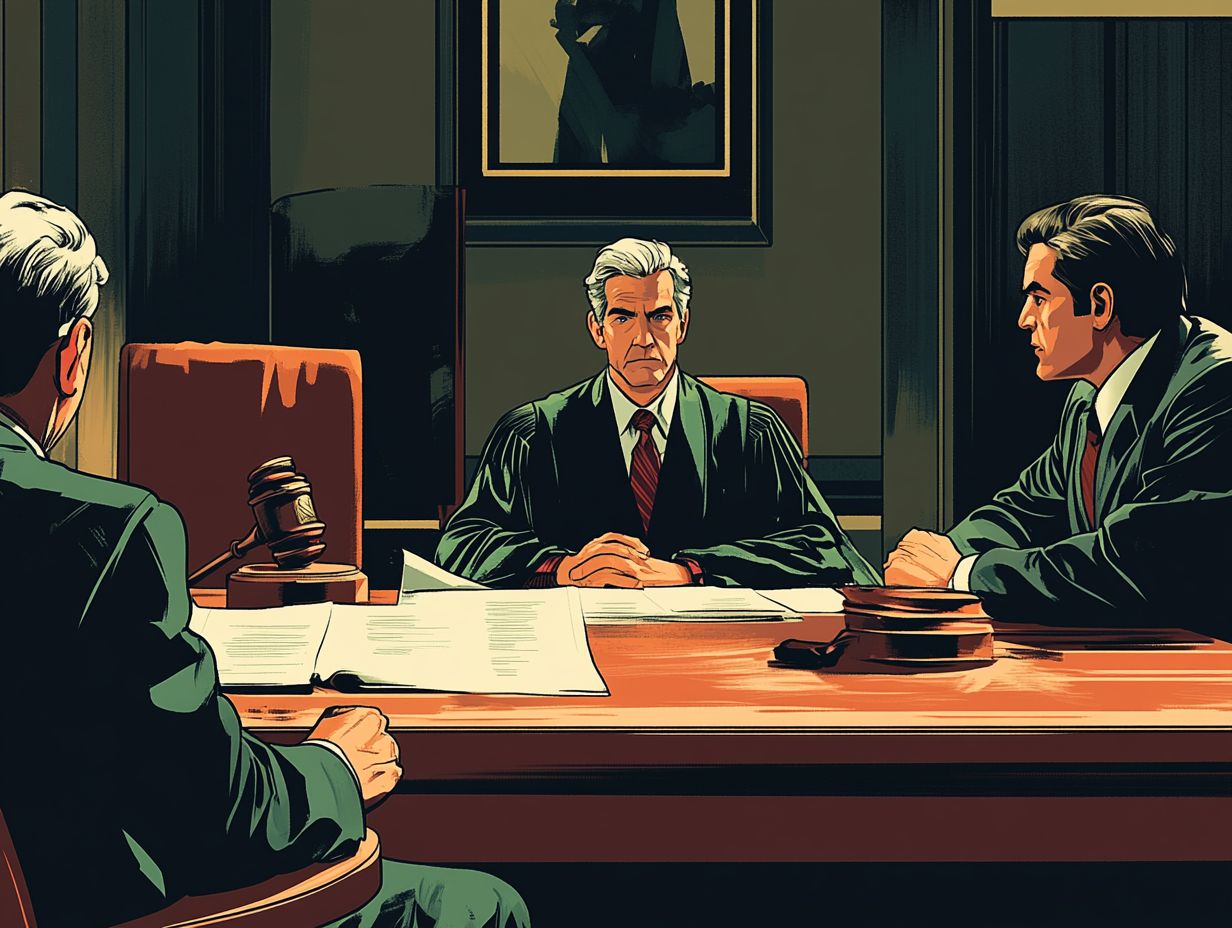
Plea agreements come in different types. These include guilty pleas, no contest pleas, and Alford pleas.
Each type has a specific purpose. They come with unique legal implications for defendants. Knowing these distinctions can greatly affect your case and legal strategy.
Guilty, No Contest, and Alford Pleas
Guilty pleas, no contest pleas, and Alford pleas represent significant legal decisions that require careful consideration, as each carries unique consequences for your criminal record and legal rights.
Understanding these distinctions is crucial for anyone navigating the complexities of the judicial system.
A guilty plea signifies an admission of guilt, leading to a conviction and potentially severe penalties, including jail time.
In contrast, a no contest plea allows you to avoid a direct admission of guilt while still accepting the consequences, which can be beneficial in related civil litigations.
An Alford plea lets you maintain your innocence but acknowledges that the prosecution has enough evidence for a conviction.
The choice among these pleas can drastically shape your future and influence your criminal record. Think carefully about the implications of each option before deciding!
Benefits and Drawbacks of Plea Agreements
Plea agreements present a nuanced landscape of benefits and drawbacks that can profoundly shape your decision-making process.
While they offer a pathway to resolve your case more swiftly, they also carry the weight of serious penalties and the uncertainty of trial outcomes. Balancing these factors is essential as you navigate your options.
Pros and Cons for Defendants and Prosecutors
For both defendants and prosecutors, the pros and cons of plea agreements can significantly influence the outcome of a case.
Defendants may benefit from reduced charges, while prosecutors achieve judicial economy.
When you negotiate a plea deal, you often gain a sense of certainty that a trial might fail to offer. This could mean lighter sentences and the chance to move forward with your life.
However, this certainty comes at the cost of an admission of guilt, which can leave lasting implications for your future.
Conversely, plea agreements allow prosecutors to utilize their resources more efficiently.
By streamlining case processing and avoiding protracted trials, they contribute to the timely administration of justice.
This delicate balance of benefits and drawbacks is vital in the decision-making process for everyone involved.
What Happens After You Reach a Plea Agreement?
Once you reach a plea agreement, the next steps entail attending a sentencing hearing. During this hearing, the judge will review the terms of the plea and ultimately make a final sentencing decision.
This decision will be based on established guidelines and your adherence to the agreement.
Sentencing and Fulfilling Terms of Agreement

During the sentencing hearing, fulfilling the terms of your plea agreement is absolutely crucial. If you fail to comply, you could face severe consequences, including the possibility of a harsher sentence.
Adhering to the agreement not only showcases your accountability but also significantly influences how the court perceives your overall character and intentions.
As the court evaluates your compliance, it will consider whether you ve followed through on stipulations like completing community service, attending rehabilitation programs, or paying restitution.
Non-compliance can jeopardize your rights, potentially resulting in the loss of any benefits from the plea deal and exposing you to the original charges and associated penalties.
Ultimately, grasping these implications highlights the importance of taking the plea agreement seriously, reinforcing your commitment to rehabilitation and respect for the legal process.
Challenging or Withdrawing a Plea Agreement
Challenging or withdrawing a plea agreement can be complex. You have certain options if you believe you have valid reasons to dispute your guilty plea.
It’s essential to navigate this process carefully, ensuring that you understand your rights and the implications of your choices.
Options for Disputing or Revoking the Agreement
You may choose to dispute or revoke a plea agreement contract for various legal reasons that can arise after you’ve entered a plea. This decision might stem from a shift in circumstances, such as new evidence coming to light or a compelling belief that the terms weren’t fully understood at the time of the agreement.
Your legal rights in this scenario include the ability to present your case in court, where you can argue for the revocation based on claims like not receiving proper legal advice or coercion.
Pursuing this can lead to serious consequences, including harsher sentencing if the court denies your request. The process typically involves filing a motion to withdraw the plea, followed by a hearing where you must provide clear reasons for your request.
This underscores the complexity of navigating such legal terrain, requiring careful consideration and strategic planning.
Frequently Asked Questions
What Happens to Plea Agreements?
When a defendant enters into a plea agreement, it is a legally binding contract between the defendant and the prosecutor. The agreement outlines what will happen next.
Can a Plea Agreement Be Withdrawn?
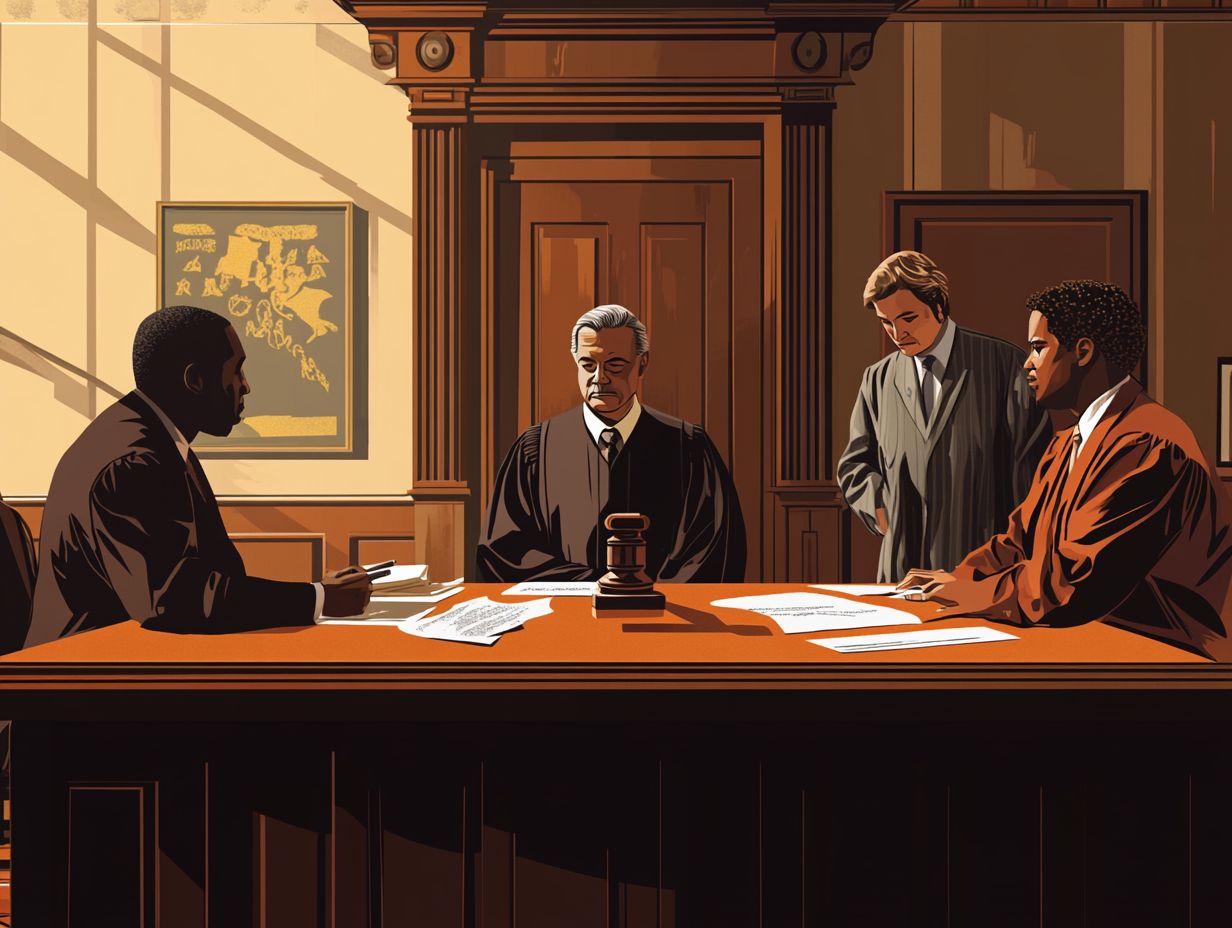
In some cases, a defendant may change their mind and want to withdraw from the plea agreement. However, this is not always possible. The terms of the agreement may have specific provisions for withdrawal, and the judge will ultimately decide if it is allowed.
What Happens if a Plea Agreement is Violated?
Ever wondered what happens if you violate a plea deal? Here s the scoop: If a defendant violates the terms of the plea agreement, the prosecutor may file a motion to revoke the agreement. This could result in the defendant facing trial for the original charges and potentially facing harsher penalties.
Do All Criminal Cases Use Plea Agreements?
No, not all criminal cases use plea agreements. It is up to the discretion of the prosecutor and the defendant’s attorney to negotiate and agree on a plea deal.
Can a Judge Reject a Plea Agreement?
Yes, a judge has the power to reject a plea agreement if they believe it is not in the best interest of justice. This is rare, but it can happen if the judge feels the terms are too lenient or too harsh.
What Happens if a Defendant Refuses to Enter into a Plea Agreement?
If a defendant refuses to enter into a plea agreement, the case will proceed to trial. The defendant will then have their case heard by a judge or jury, and a verdict will be decided based on the evidence presented.
If you have questions about plea agreements, it s essential to consult a legal professional for guidance.

